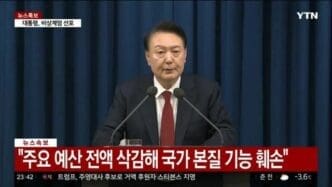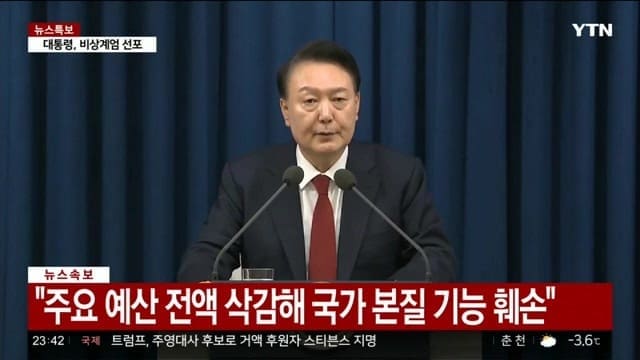In a surprising turn of events, South Korean President Yoon Suk Yeol has publicly apologized for his controversial decision to declare martial law just hours before a significant parliamentary vote that could see him impeached.
Yoon appeared on national television to express his regret over the anxiety his actions may have caused the public, promising that he would take full responsibility both legally and politically. He conceded that his attempt to impose martial law reflected desperation and acknowledged the unintended public distress it caused. This move came at a critical juncture in his presidency, as he faces potential impeachment from an opposition-controlled parliament that has been challenging his leadership since he took office in 2022.
Yoon has described the South Korean parliament as a “den of criminals,” accusing it of impeding state affairs. He has vowed to eliminate what he terms “shameless North Korea followers and anti-state forces.” Despite his strong rhetoric, opposition parties have moved to impeach him, controlling the majority needed to pass such a motion. The chair of Yoon’s conservative party, although critical of his actions, remains formally opposed to impeachment.
The declaration of martial law, the first in over four decades, drew swift backlash and mobilized protests across Seoul. Thousands rallied, calling for Yoon’s ouster, reflecting widespread dissatisfaction. Meanwhile, a segment of Yoon’s supporters organized smaller gatherings, demanding a halt to what they view as an unconstitutional impeachment process.
The situation escalated with allegations of Yoon directing the military to detain opposition politicians during the brief martial law period. This accusation has been a point of contention, with opposition leader Lee Jae-myung labeling Yoon’s actions a self-coup, urging either his resignation or impeachment. Yoon’s televised apology did little to soften the demands for his immediate removal from office.
While the parliament will soon decide on the president’s fate, the ramifications of this political crisis are already significant. Major diplomatic partners such as the United States and Japan are expressing concern over the instability in what is considered one of Asia’s strongest democracies. The potential suspension of Yoon’s powers, should impeachment proceed, would leave a political vacuum during the Constitutional Court deliberations.
President Yoon’s actions have had far-reaching consequences beyond his potential impeachment. Key military figures involved in enforcing the martial law decree have been suspended, and former Defense Minister Kim Yong Hyun is under investigation for rebellion charges. The political landscape remains uncertain, with the possibility of a presidential by-election looming if Yoon is removed.
The political turmoil in South Korea following President Yoon’s declaration of martial law underscores the fragility of the nation’s governance. As tensions rise and the world watches, the upcoming days will be pivotal in determining the country’s political future.
Source: WSVN








